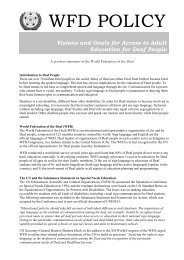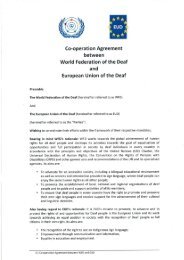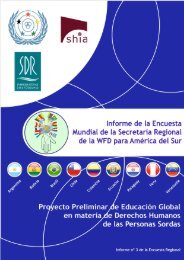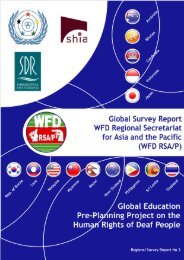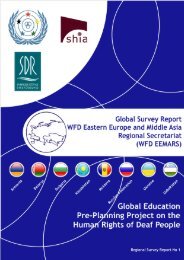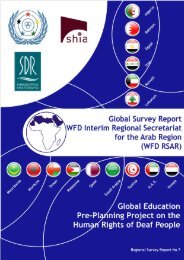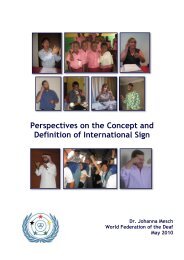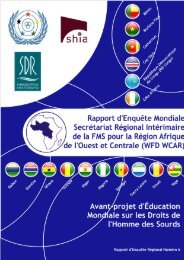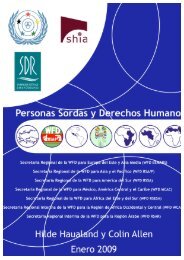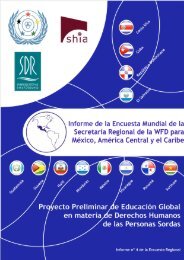Page No 1 - World Federation of the Deaf
Page No 1 - World Federation of the Deaf
Page No 1 - World Federation of the Deaf
Create successful ePaper yourself
Turn your PDF publications into a flip-book with our unique Google optimized e-Paper software.
Ano<strong>the</strong>r question sought information on <strong>the</strong> number <strong>of</strong> <strong>Deaf</strong> people who are unemployed, and none <strong>of</strong> <strong>the</strong> 12 respondents had<br />
this information. However, <strong>the</strong>y did state that <strong>the</strong> reasons for unemployment were <strong>the</strong> lack <strong>of</strong> an equal employment<br />
opportunity law; <strong>the</strong> low level <strong>of</strong> education; and communication difficulties.<br />
The final question asked if <strong>the</strong>re were any employment services to assist unemployed <strong>Deaf</strong> people to find positions and also<br />
asked who is responsible for this service. Seven out <strong>of</strong> 12 countries (Costa Rica, Cuba, Dominican Republic, Guatemala,<br />
Honduras, Mexico and Nicaragua) have specialised services <strong>of</strong>fered by both <strong>the</strong> Government Employment Service and <strong>the</strong><br />
National Association <strong>of</strong> <strong>the</strong> <strong>Deaf</strong> to assist <strong>Deaf</strong> people to gain employment.<br />
4.10 General Comments<br />
Five issues <strong>of</strong> common concern faced by every National Association <strong>of</strong> <strong>the</strong> <strong>Deaf</strong>/<strong>Deaf</strong> Group globally were listed, and all 12<br />
countries prioritised <strong>the</strong>se issues for <strong>the</strong> <strong>Deaf</strong> community in <strong>the</strong>ir country. Please note: <strong>the</strong> majority <strong>of</strong> <strong>the</strong> countries ticked<br />
more than one ‘highest priority’. The results are:<br />
Highest Priority Issues Country/Average Percentage<br />
Better quality <strong>of</strong> <strong>Deaf</strong> Education 11 Countries (92%)<br />
Recognition <strong>of</strong> your country’s Sign Language(s) by your country’s Government 8 Countries (67%)<br />
Equal Opportunity in Employment 8 Countries (67%)<br />
Improved quality and access to Government and Community Services 7 Countries (58%)<br />
Better Sign Language Interpreting quality and services 6 Countries (50%)<br />
O<strong>the</strong>rs 3 Countries (25%)<br />
O<strong>the</strong>rs<br />
• Consideration must be given to Human Rights Issues for <strong>the</strong> <strong>Deaf</strong> Community<br />
• Provision <strong>of</strong> information to <strong>the</strong> <strong>Deaf</strong> Community is necessary<br />
• Increased knowledge about <strong>Deaf</strong> Awareness is necessary<br />
Leadership Training Programme<br />
Counselling Service for parents and families <strong>of</strong> <strong>Deaf</strong> people<br />
The final part <strong>of</strong> <strong>the</strong> survey provided <strong>the</strong> opportunity for each country to list any o<strong>the</strong>r concerns about <strong>the</strong> standard <strong>of</strong> living<br />
<strong>of</strong> <strong>Deaf</strong> people. Eight countries (Costa Rica, Dominican Republic, El Salvador, Guatemala, Haiti, Honduras, Mexico and<br />
Panama) took <strong>the</strong> opportunity and expressed <strong>the</strong> following common areas <strong>of</strong> concern:<br />
Government<br />
• Provision <strong>of</strong> financial support for project work<br />
• Attention to vital issues for <strong>the</strong> <strong>Deaf</strong> community (e.g. Education, Employment, Health and Security and Social<br />
Welfare)<br />
• Access to government services needs to be improved<br />
• Government must take responsibility to achieve a better quality <strong>of</strong> life for <strong>Deaf</strong> people<br />
Education<br />
• The quality <strong>of</strong> <strong>Deaf</strong> Education must be improved<br />
• Legislation must be created to enable access to Higher Education for <strong>Deaf</strong> people<br />
• Government should take responsibility to manage <strong>the</strong> <strong>Deaf</strong> Schools (including provision <strong>of</strong> financial support)<br />
• Teachers should be fluent in sign language<br />
Sign Language<br />
• Sign Language teachers should be <strong>Deaf</strong> people only<br />
• Recognition <strong>of</strong> sign language should become a priority issue<br />
• Partnerships with international organisations should be established in order to research sign language<br />
Sign Language Interpreters<br />
• Quality <strong>of</strong> sign language interpreting services must be improved<br />
• Partnerships with international organisations should be established to provide training for Sign Language Interpreters<br />
Employment<br />
• Equal Employment Opportunities for <strong>Deaf</strong> people should be promoted<br />
• Vocational Training for <strong>Deaf</strong> people is necessary<br />
The Project was under <strong>the</strong> auspices <strong>of</strong> <strong>the</strong> Swedish National Association <strong>of</strong> <strong>the</strong> <strong>Deaf</strong> (SDR) and <strong>the</strong> <strong>World</strong> <strong>Federation</strong> <strong>of</strong> <strong>the</strong> <strong>Deaf</strong> (WFD), <strong>Page</strong> <strong>No</strong> 23<br />
and funded by <strong>the</strong> Swedish Agency for International Development Cooperation (Sida) and Swedish Organisations’ <strong>of</strong> Disabled Persons<br />
International Aid Association (Shia).



